This year’s selection, presented in no particular order:
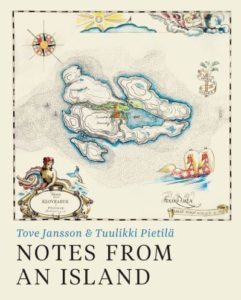 Notes From an Island by Tove Jansson & Tuulikki Pietilä Finland
Notes From an Island by Tove Jansson & Tuulikki Pietilä Finland
In 1963 Tove Jansson and her partner Tuulikki Pietilä set up their summer home on Klovharun, an almost barren outcrop of rock in the Gulf of Finland. The two women then spend the next 26 summers on Klovharun: writing, painting, fishing and simply contemplating the sea, sky and local wildlife. They only left when they eventually became too old and frail to cope with the challenges of island life. This new English translation, by Thomas Teal, tells the story of their time there.
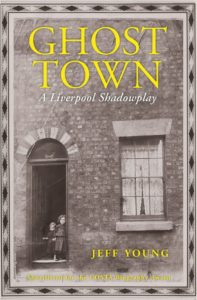 Ghost Town: A Liverpool Shadowplay by Jeff Young Liverpool
Ghost Town: A Liverpool Shadowplay by Jeff Young Liverpool
Liverpool is a city populated by ghosts. Jeff Young evokes people, buildings and whole streets that are long gone but which still exist in shadow form. Liverpool is a radically different city from that of the 1970s, but its ghosts still inform the city’s character. Ghost Town is not just something written by Young; it is, in the truest sense, part of him. He and his ghosts inhabit every page. Open it up and smell the diesel fumes from a Crosville bus, hear the lowing of ships’ horns on the Mersey, taste the bitterness Higson’s ale and run your fingers over the yellowing coarseness of the pages of a second-hand paperback from the comic shop on Moorfields.
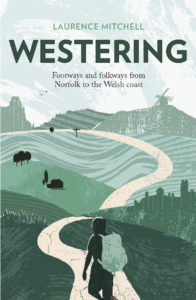 Westering: Footways and folkways from Norfolk to the Welsh coast by Laurence Mitchell England and Wales
Westering: Footways and folkways from Norfolk to the Welsh coast by Laurence Mitchell England and Wales
Westering is an account of Laurence Mitchell’s journey on foot from the North Sea coast at Great Yarmouth across the waistline of England and then Wales to end up at the shore of the Irish Sea at Aberystwyth. Mitchell describes his journey in a quiet, understated way but the effect is, nonetheless, profound. By focussing on small details, examining forgotten, liminal places, he is able to reflect on broader themes, such as belonging and loss.
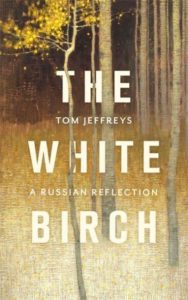 The White Birch: A Russian Reflection by Tom Jeffreys Russia
The White Birch: A Russian Reflection by Tom Jeffreys Russia
The birch tree is the unofficial national emblem of Russia and is a ubiquitous presence throughout that nation’s forests. For Tom Jeffreys it is the birch, and in particular the white birch, that he employs to get a handle on the nature of what it is to be Russian. Jeffreys travels across Russia, from the Finnish border to Vladivostok on Russia’s Pacific coast, and everywhere he goes he finds birch trees from one species or another of the genus Betula. With The White Birch, Jeffreys has discovered his own very unique voice and produced a work that is both profound and beautifully written.
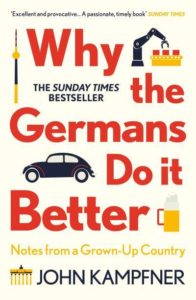 Why the Germans Do It Better: Notes From a Grown-Up Country by John Kampfner Germany
Why the Germans Do It Better: Notes From a Grown-Up Country by John Kampfner Germany
Why the Germans Do it Better is a work of meticulous research and sober analysis; a well-written overview of post-war German history. This book is as much a book about Britain as it is about Germany. Kampfner does not lecture his readers: we are left to draw our own conclusions. But present-day Britain does not compare well with our neighbours from across the North Sea. Germany is indeed a grown-up country, one that has come to be at peace with its past and comfortable with its role in Europe. Whereas Britain, he suggests, is trapped in the past and swayed by a fantasy world of imperial power
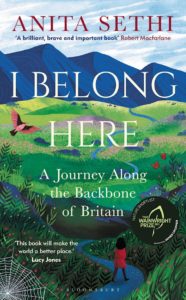 I Belong Here: A Journey Along the Backbone of Britain by Anita Sethi Northern England
I Belong Here: A Journey Along the Backbone of Britain by Anita Sethi Northern England
All too often people of colour are made to feel that they do not belong in England’s countryside; that it is a place that is not for ‘people like them’. Anita Sethi was forced to confront this corrosive notion when she was subjected to a sustained attack of racial abuse and hatred on a busy train between Liverpool and Newcastle in 2019. She sought to heal the wounds of the incident by going out into the wilds and walking. She sensed, almost instinctively, that there was healing to be found in the landscape. The long-distance walk that Sethi decided upon, as a woman from the North, was a journey along the northern backbone of England: the Pennines.
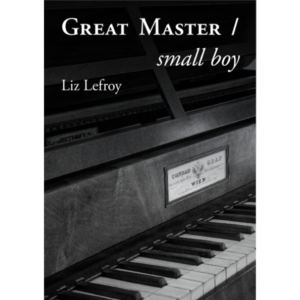 Great Master / small boy – by Liz Lefroy Germany and Austria
Great Master / small boy – by Liz Lefroy Germany and Austria
This new collection of poems by Liz Lefroy is inspired by a trip she and her son took in 2018. It comprises a series of short, linked pieces describing their journey to present-day Bonn and Vienna looking for echoes of Beethoven’s life in both cities. For Liz this was also a temporal journey, a very personal one, casting her mind’s ear and eye back to her childhood and memories of her mother, a talented pianist.
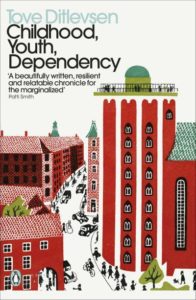 Childhood, Youth, Dependency by Tove Ditlevsen Copenhagen
Childhood, Youth, Dependency by Tove Ditlevsen Copenhagen
The three volumes of the Danish poet’s autobiography are now published together in an English translation for the first time. Tove Ditlevsen tells the story of her journey from childhood poverty, through the negative attitudes towards creative women of most of the men she encounters, to finally becoming one of Denmark’s foremost poets of the twentieth century. She speaks candidly about her struggles with mental health and addiction.
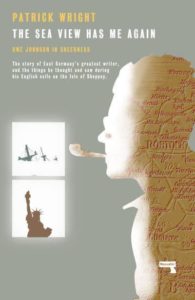 The Sea View Has Me Again: Uwe Johnson in Sheerness by Patrick Wright Germany, New York and Sheerness
The Sea View Has Me Again: Uwe Johnson in Sheerness by Patrick Wright Germany, New York and Sheerness
It may at first seem puzzling that Uwe Johnson, one of Germany’s most accomplished writers of the twentieth century, should spend the final ten years of his life in Sheerness on Kent’s Isle of Sheppey. But having lived out his childhood and young adult years on Germany’s Baltic coast, this low-lying island in the Thames estuary, a bleak and windswept place, must have seemed uncannily familiar. Patrick Wright has produced a work concentrating on the last ten years of Johnson’s life. It is also a book, a very detailed book, about Sheerness. Wright’s deep-dive research is evident on almost page.
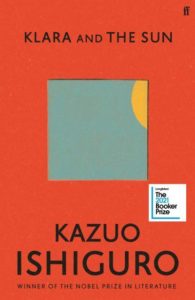 Klara and the Sun by Kazuo Ishiguro The Future
Klara and the Sun by Kazuo Ishiguro The Future
Kazuo Ishiguro’s latest novel is set in a not too distant dystopian future. Klara is an Artificial Friend recruited as companion to a teenage girl with severe health problems. We see the world, which could so easily be our own, through Klara’s eyes, gaining insights from her acute observational skills. Ishiguro creates a believable and fully-realised alternative world and uses it to explore ideas of love, loss and the the very nature of consciousness.
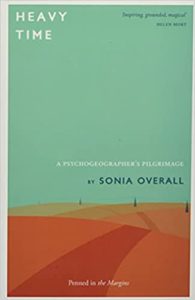 Heavy Time: A Psychogeographer’s Pilgrimage by Sonia Overall England
Heavy Time: A Psychogeographer’s Pilgrimage by Sonia Overall England
From Sonia Overall’s idea of making her own pilgrimage, the journey chronicled in Heavy Time, was born. But this is not a traditional pilgrimage seeking ‘miracles’, she was instead ‘on the psychogeographical scent, a hunter of spirits of place.’ Overall’s plan was to take the old pilgrims’ way from Canterbury to Southwark cathedral, reversing the route followed by Chaucer’s travellers. From London she planned to walk to Ely: a journey back into her childhood. From here her walk would continue to Walsingham, a place with particular significance for Overall and the destination of many a medieval pilgrim.
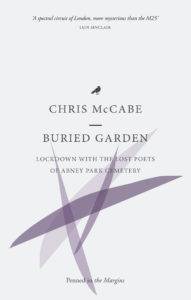 Buried Garden: Lockdown with the Lost Poets of Abney Park Cemetery by Chris McCabe London
Buried Garden: Lockdown with the Lost Poets of Abney Park Cemetery by Chris McCabe London
Buried Garden is the fourth volume of Chris McCabe’s exploration of the so-called lost poets of London’s Victorian cemeteries. This book is an attempt to unearth, in a literary sense, the forgotten poets buried beneath the soil of Abney Park Cemetery in Stoke Newington. But there is, suggests McCabe, another garden at Abney Park: a garden of the imagination, or perhaps even one existing in an alternative reality. Arthur Machen’s secret garden of Stoke Newington constantly infiltrates its way into McCabe’s researches and his wanderings.
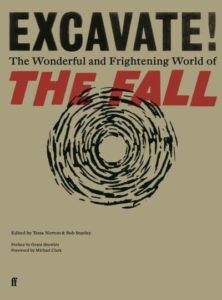 Excavate! The Wonderful and Frightening World of The Fall by Tessa Norton & Bob Stanley Prestwich
Excavate! The Wonderful and Frightening World of The Fall by Tessa Norton & Bob Stanley Prestwich
Edited by Tessa Norton and Bob Stanley, this weighty collection contains essays, artwork and photographs charting the career of Mark E Smith and The Fall. They were, of course, music’s perennial contrarians and outsiders. But this volume is far more than another rock biography or an expanded fanzine. Excavate! provides a lens through which to view an alternative history of Britain over the last forty years.
Most of the books recommended above are more extensively reviewed elsewhere in this blog.

Excellent books! I’m glad I found your blog this year!
Thanks Liz!